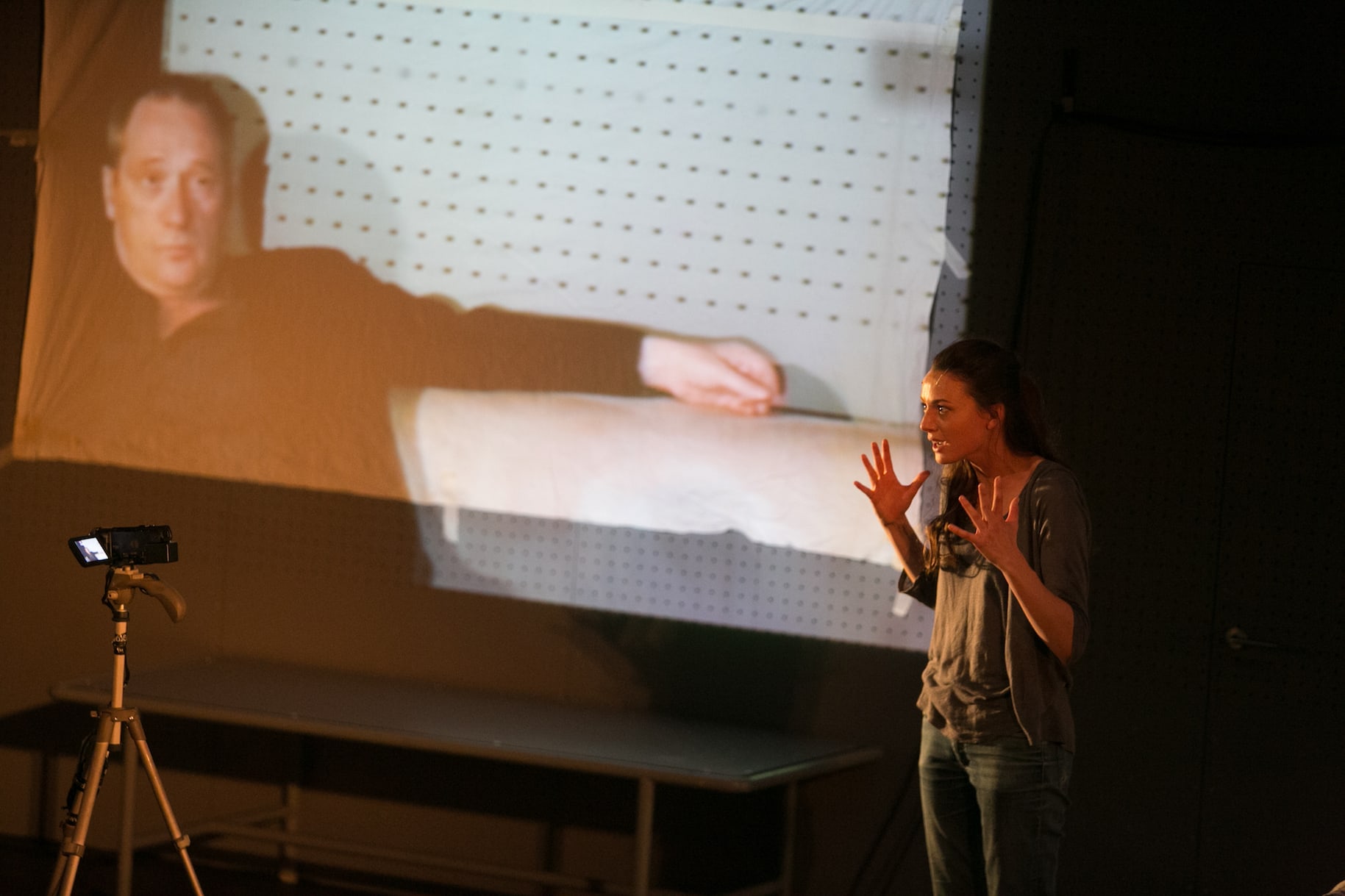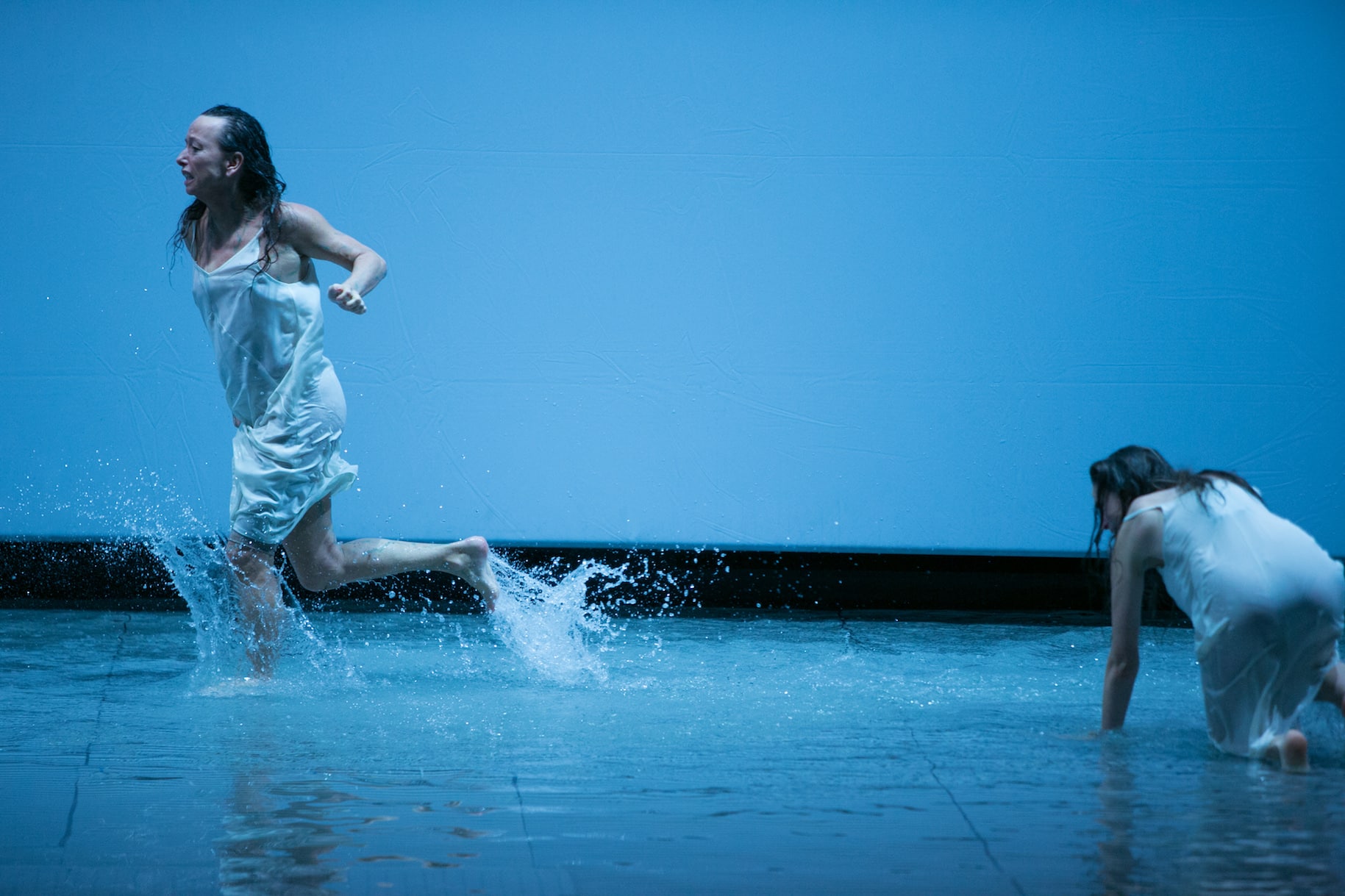Back in college in Minnesota, I was so into the forlorn films of Ingmar Bergman that I think he affected my mental health. I could relate to his bleak Nordic worldview, which I associated with long dark winters and repressive religion, never a good combination. So for years whenever I felt bummed or blue, I would go see a Bergman film to cheer myself up. And it always worked. Because if he could so matter-of-factly confront the existential abyss of life and make out of it such great art, what the hell was I belly-aching about? Compared with the soul-wrenching crises his characters kept having, my problems were small-potatoes.
Bergman’s downers were my uppers.
Last night in the Eisenhower Theater I watched Director Ivo van Hove’s powerfully penetrating stage adaptations of two screenplays by Bergman in the Eisenhower Theater at The Kennedy Center. And as I sat transfixed—along with what seemed the entire audience—I remembered why I fell so hard for the Swedish filmmaker’s work in my youth. Bergman, I was reminded, held up a fearless lens and through it stared down human despair, disillusionment, guilt, grief, carnality, rejection, existential angst. He did not blink or look away, nor did he humor us. And van Hove’s spectacular yet minimalist staging had faithfully stripped Bergman’s cinematic language to its emotional essentials, conveyed by mesmerizing performers. So it was that just like years ago when I would walk out of a movie house showing a Bergman flick with my cloud of gloom gone, I left the Eisenhower elated.

The evening consists of two parts connected by a theater theme. The first is After the Rehearsal, based on a television movie Bergman wrote and directed in 1984. It is a multilayered, brutally raw psychosexual drama about two actresses in the life of a controlling, emotionally manipulative, and rapacious theater director named Hendrik (the formidable Gijs Scholten van Ashat, who, fascinatingly, makes Hendrik not a total dick). The play occurs backstage in Hendrik’s office, a wide expanse designed by Set Designer Jan Versweyveld with tacky casting couch and a sleezy sheet taped to the wall on which Hendrik sometimes projects images from a video camera as in a voyeuristic screen test.
The imperious way Hendrik doles out parts in his plays to women affirms the adage that power is the greatest aphrodisiac, and in Bergman’s depiction of these women, both are smitten. The younger is a beautiful 23-year-old, Anna, currently in rehearsal for a Strindberg play Hendrik is directing (Gaite Jansen’s nuanced performance of the seductively wise ingenue is a gem). The sexual electricity between Anna and Hendrik would light up a few fresnels, and we are led to suppose they are headed toward a pre-#MeToo affair.
Sound Designer Roeland Fernhout interrupts their heatup with some startling loud music cues that suggest time may be being played with, maybe place too. And sure enough, in comes another woman, 46-year-old Rachel who arrives in what is apparently Hendrik’s memory or imagination (Anna, who is onstage the whole time, is oblivious to her). Turns out, Rachel is Anna’s mother, whom Anna loathes but with whom Hendrik had a years-long liaison before Rachel became a broken-down alcoholic whom he no longer cared to cast. Rachel (an amazingly unfiltered and crazily compelling Marieke Heebink) wants Hendrik to want to have sex with her again, and unsurprising we are led to suppose that the haughty horndog does.
That all sounds like a sordid soap opera but that’s not how After the Rehearsal plays out at all. Performed in Dutch in a production by Toneelgroep Amsterdam, with clear, easy-to-read surtitles projected on the set, After the Rehearsal is a theatrical eruption of Bergmanesque language ripped from some roiling subconscious that sometimes makes your eyes pop and jaw drop just to read.

The second play, Persona, is also about two women, but this time the sexual electricity is theirs and there’s no man between them to please (other than, arguably, the auteur). It is based on Bergman’s 1966 classic by the same name starring Bibi Andersson and Liv Ullmann. In the film as in van Hove’s adaptation, a famous stage actress named Elizabeth Vogler has abruptly become mute in the middle of performing Electra, and she and a nurse named Alma withdraw to an island where, ostensibly as therapy for the actress’s inexplicable silence, the two women embark on what becomes an erotically charged commingling of personalities.
Heebink returns as the actress having a meltdown, Jansen returns as the earnest and caring nurse, and together they possess the stage like furies at the rapture. The play begins with the tortured actress lying nude and still on a stainless steel table under harsh hospital fluorescents, and the story is set up by a Doctor (an impressively shrink-like Frieda Pittoors), who narrates at length what has befallen Elizabeth and what the course of treatment will be.
I’ll take a moment to note that the Doctor’s long monologue is one of many instances during the evening where van Hove’s minimalist staging and Bergman’s distilled language achieve such a grip on the audience that vast passages go by of just people staying still and talking, and we listen with the kind of rapt attention said to make pin-drops resound.
And I’ll digress again to say that the scenic effects in Persona are so phenomenal and astounding I dare not give them away—except to tease that they involve falling walls, wind, and water. The stage spectacle combines with Persona’s explosive psychic and erotic revelations to create an experience for which enthralling and thrilling are insufficient words.
Running Time: Three hours, including one intermission.
After the Rehearsal and Persona play through Sunday, April 22, 2018, in the Eisenhower Theater at The John F. Kennedy Center for the Performing Arts – 2700 F Street, NW, in Washington, DC. For tickets, call (202) 467-4600, or purchase them online.
Other recent productions directed by Ivo van Hove presented by at The Kennedy Center:
Review #1: ‘A View From the Bridge’ at The Kennedy Center by Review #2: ‘A View From the Bridge’ at The Kennedy Center by In the Moment: ‘A View From the Bridge’ at The Kennedy Center by ‘Antigone’ at The Kennedy Center by




